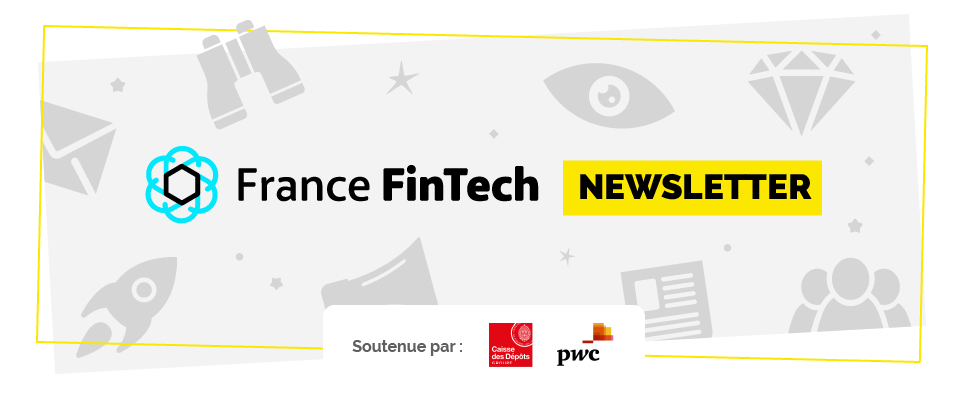Why does fintech supply most French unicorns in 2021? Response with Alain Clot, President of France FinTech
This is the rapidly accelerating sector of activity in France. Fintech or technological finance today brings together 700 companies for 30 jobs. In very strong growth, it should create more than 000 additional jobs in 10. It is also an attractive area for many international investors. They are a dozen fintechs today to exceed the billion dollars in terms of valuation. They have entered the category of “unicorns”. These start-ups cover a wide spectrum of activities: online payment, neo-banking, insurtech, cryptocurrency, traditional and crowdfunding and even robo-advisors. To represent and lead this community, the France FinTech association was created in 000. It now has 2022 members and organizes its major event every year, “ FinTech Revolution ". Its president Alain Clot details the growth factors of this rapidly accelerating sector.
Actu-Juridique: What does fintech represent in the more global sector of finance in France?
Alain Clot : Fintech is a concentrate of innovations, which stimulates the traditional world of finance. To date, more than half of fintechs are in BtoB. The client is therefore the bank or the insurance company. There are more than 1 partnerships identified between traditional players and those in technology finance. The market is growing and BtoC (talking directly to the end customer) is now growing faster than BtoB. We are therefore both cooperative and competitive. We call this in the jargon of the new economy “coopetition”. There is interpenetration and reciprocal stimulation. It has also resulted in a major wave of capital investment by banks and insurance companies in fintechs. Sixty majority stakes, then a number of minority stakes. The frequency of this type of operation has slowed down somewhat for several years, on the one hand because large establishments are not intended to multiply them, but also fintechs now have wide access to venture capital financing. , which they lacked at the time.
Today, the overall market share of fintechs is still significantly more modest than that of the banking sector, even if the growth rate is extremely strong. In 2021, our turnover experienced a very strong acceleration. This should continue in 2022, and is reflected in particular by a recruitment budget of 10 employees, i.e. a third more. My feeling, from what I observe, is that it could be even more. A number of my members will double in size this year.
AJ: In the fintech sector, there are many unicorns…
AC : The year 2021 saw the emergence of five new unicorns. They are added to the three previous ones: Ledger, Alan, Lydia, Swile, Shift Technology, Ivalua, PayFit and Dataiku. Since the beginning of 2022, Qonto and Spendesk have been added. It is interesting to note that five of the thirteen unicorns that appeared in France in 2021 are fintechs. Our domain is the first sector of French unicorns, with ten out of twenty-five.
AJ: What areas of fintech are these unicorns engaged in?
A. C. : It is well diversified in terms of activity or underlyings. From the champion of cryptocurrency security like Ledger to one of the future European leaders in neo banking for SMEs like Qonto, passing through the emblematic model of payment application that is Lydia or the saving bills and accounting with Spendesk. It's extremely distributed. The whole field of fintech is booming, which is explained by several factors. First, it's the product of seven to eight years of investment for the most part. Then, French innovative finance left earlier than most other markets. The French are among the first consumers to have had access to their account and to be able to carry out transactions remotely. This long before the Americans or the English. Minitel already enabled financial services applications. The arrival of the internet has enabled the French to be pioneers in remote and alternative finance. But the French fintech then fell significantly behind the Anglo-Saxons because it lacked three resources. Today we made up for that delay.
AJ: What are these resources that have enabled the development of fintech in France?
AC : The first is venture capital. We were among the last in Europe in this field. The financing market in France was almost exclusively through banks, which practically did not finance start-ups. Today, we are among the first in terms of venture capital. It has been widely supported, it is true, by global investors, due to the attractiveness of our ecosystem and of France in general.
The second resource corresponds to support through regulation or regulations favorable to technological innovation. French regulators considered until a few years ago that this was not really part of their mandate. A sort of “cultural revolution” has taken place in France. Our supervisors have coordinated, in particular the Financial Markets Authority (AMF) and the Prudential Control and Resolution Authority (ACPR). For example, they lead the Fintech Regulation Forum, a joint body that brings together players in the ecosystem and deals with regulation-supervision issues. Our regulators have also created a number of schemes to support the sector. These are in particular dedicated teams, competent in the technological fields and daily referents of fintech.
Finally, the third resource – and the main one – is the market itself. Today, consumers are diversifying their suppliers. They have become more mobile and want to be actors in their access to financial services. Fintechs allow them to build their payment, account management and financing solutions, thanks to applications. They are much more demanding when it comes to services and prices and want to find the best user experiences and access the best that technology offers. For example, one in three French people between the ages of 18 and 35 is a customer of the Lydia application.
AJ: How is the Île-de-France region at the heart of French fintech?
AC : Île-de-France represents approximately 85% of the market. It is true that it offers a deep pool of skills, a very important academic center with prestigious establishments. But it also results from the extremely centralizing structure of our country. French finance is in his image. From this point of view, fintech is unfortunately no exception, despite the rapid development of magnificent platforms throughout the regions. Regarding the Paris region, we have many "hubs", positioned mainly in the inner suburbs of the Paris region. Let's mention Swave, the first fintech incubator in France, Station F or Plateform58. There is also a certain density of fintechs in the Bastille and République districts, or even in Neuilly-sur-Seine to name a few.
“Île-de-France represents around 85% of the fintech market”
We are extremely committed to supporting regional platforms. It is developing everywhere: Nancy, Lille, Lyon, Bordeaux, Toulouse, Marseille-Aix, Montpellier, etc. These are high quality platforms, which we support as much as we can. One of the keys to the success of a hub is true ecosystem operation. That is to say a community of interacting players: fintechs, major financial institutions, academia, public authorities, funds.
AJ: How has the fintech sector positioned itself in the face of the health crisis?
A. C. : Like everyone else, we experienced a moment of amazement at the start of the health crisis in March 2020. We had to deal with a funding "air pocket". At the same time, our members have taken a large number of solidarity measures for caregivers, people in social difficulty, SMEs and traders. After this moment of a few weeks, the funding came back.
Two sectors, rather marginal with us, have suffered from the health crisis: activities related to events. For example, “peer to peer” (P2P) pools associated with events. Or those related to physical trade, penalized by confinements. But all that resumed and the rest of the activities grew very strongly.
Overall, fintech has experienced a very strong acceleration in 2021. Consumers, individuals and businesses have made much more use of applications and contactless payment. This period accelerated a movement to use remote financial services, which had already been growing rapidly.
AJ: How are fintech companies managing this situation of strong acceleration?
AC : Supported by this strong growth, the fintech model is evolving in several ways:
- first, they started with a management where the leader knew all his collaborators, often with a unity of place. Today, with the change in size, the increase in staff, the multiplication of sites, fintech companies are changing. They structure themselves, including by strengthening themselves in the structuring functions: legal, finance, development of partnerships. HR and management aspects are at the heart of their concerns, especially as they integrate more and more international teams centrally or locally;
- then, we are witnessing a movement of horizontalization or platformization of the sector. Most of our members were originally centered on a vertical, ie a specific service (eg peer to peer payment). From this base, they add service offers (insurance, account management, financing, etc.). Some are aiming for the status of “super app” (essential multi-service application) or even neo-bank, with an increasingly comprehensive path;
- Finally, technology is becoming more and more important. Previously, innovation was mainly focused on usage and user experience (“UX”). Today, a much more important place is given to R&D, algorithms and data management. This movement makes possible the development of new functionalities, such as value-added advice, risk management, including credit, and allows significant productivity gains.
AJ: How has fintech regulation evolved in France?
A. C. : Strictly speaking, there is no specific regulation for fintechs. It exists in many countries around the world (UK, Switzerland, Luxembourg). This is called the “sandbox”. France has opted for so-called fair “Level Playing Field” regulations: for the same type of operation, the regulations are the same, whether initiated by a large bank or a fintech. We are therefore subject to the common system.
« Strictly speaking, there is no specific regulation for fintech »
Regulations have long been a hindrance. Today, it supports or even accelerates innovation. Thus, the General Data Protection Regulation (GDPR) establishes the customer's ownership of their data, which can be used to access new services. This is in fact an opportunity for fintechs. The same is true for the second European directive on payment services (PSD2), which allows the customer to use his banking algorithm to carry out transactions.
All of this is fully regulated. These changes are profound. Today, more than 85% of our regulations are European (particularly approvals). The national party is in the minority. But we are of course also subject to a body of French legislation and regulations and national supervision. We come under the AMF, the ACPR, the National Commission for Computing and Liberties (Cnil) or consumer credit legislation, etc.
AJ: How is French regulation proportional?
AC : Today, we are on a common system with banks and insurance companies, which is the heaviest configuration and sometimes puts us in a situation of difficult competition with regulated players abroad. Our system therefore includes certain relaxations, such as the ability to exchange with the regulator during the model adjustment phase and the consideration of the size of operations; in particular, it is a question of drawing regulatory conclusions from the fact that certain fintechs mainly carry out small operations. In “peer to peer” payment applications, for example, the majority of transactions are less than 100 euros (or even 50) and concern a transfer from account to account. These must therefore be subject to simplified procedures.


